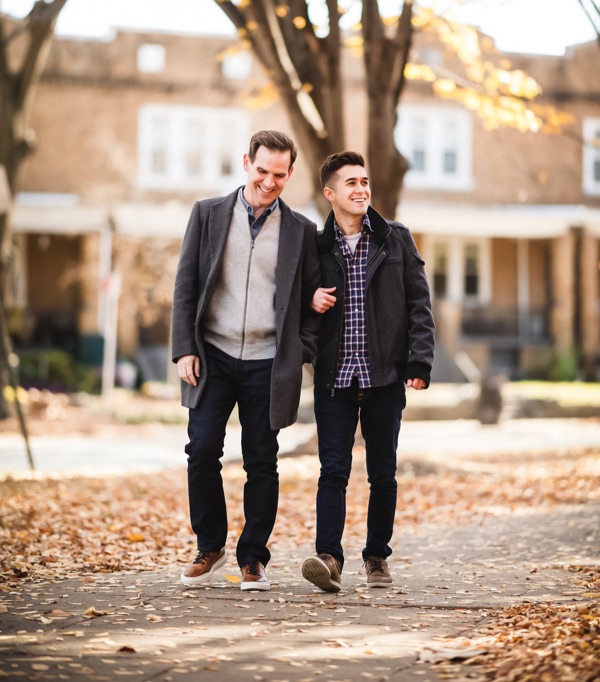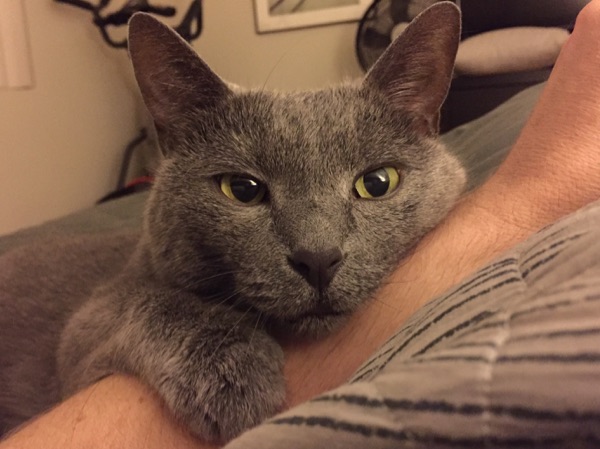NLPeople: Ana Bitter, Design Lead
Ana Bitter
Hawai’i
1. What led you to the news literacy movement?
I grew up in a household of journalists and educators. And in college I worked on the student newspaper (Ka Leo O Hawai‘i), first as a copy editor and later as a designer. So, I’ve always understood the value of being informed and providing good information to others. I came across the News Literacy Project as a new graduate searching for a job during the pandemic.
It felt like just the right opportunity at a time when I was eager to do work that could have a positive impact on a world fraught with problems. I believe design can be a tool for improving universal communication and the greater good. I’m proud to use my design skills in the service of news literacy, and I’ve learned how to be a much better consumer of information in the process.
2. What news literacy tip, tool or guidance do you most often use?
It’s one of the simpler recommendations, but I always try to “slow down” when I’m consuming any kind of information — especially when I’m skimming headlines or posts online. And when I notice myself having a strong reaction to something I see, I really try to take that pause and ask myself what I’m feeling and why, is the content playing on one of my biases?
I also try to be skeptical, which I know can be mistaken for being negative. But I try to view it as approaching information with curiosity. Being skeptical allows you to learn more and dig deeper when something turns out to be credible, and it makes you better at recognizing when something isn’t.
 3. You worked on high-profile design projects while still an undergrad, such as a piece that was exhibited in Tokyo Midtown’s “Open the Park” event, an international exhibition, which must have been exciting. What type of design work would you love to do in the future?
3. You worked on high-profile design projects while still an undergrad, such as a piece that was exhibited in Tokyo Midtown’s “Open the Park” event, an international exhibition, which must have been exciting. What type of design work would you love to do in the future?
Yes! I had some amazing opportunities during my design BFA (Bachelor of Fine Arts) coursework, which focused a lot on projects that were intended for print and existed as physical objects, like books. We worked a lot with experimental book forms, designing the interiors and exteriors. In fact, it was my passion for books and book covers, in particular, that led me to study design in the first place.
I love the idea that good design gives the information books contain — whether informative or fictional — the best chance of being consumed and enjoyed by a reader. I’ve always wanted to design for a publishing house, (selfishly) so that I could read advanced copies of books before they’re published. I would also love to work on more technical texts like cookbooks, since they have so many fun layers of information to work with. My experience here at NLP designing resources for K-12 students has sparked my interest in designing books for young readers as well.
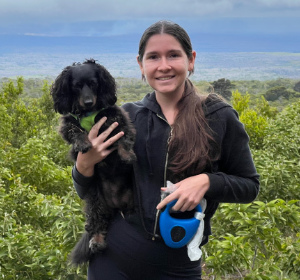
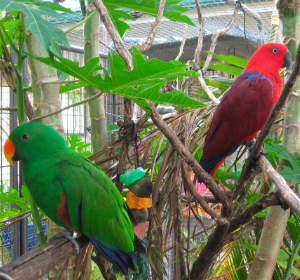
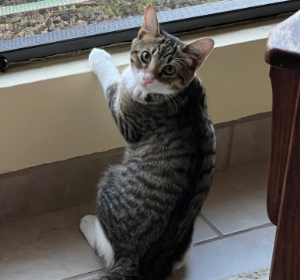
4. Are you on team dog, team cat, team wombat?
If forced to choose, I would have to say team dog (my dachshund Lila would never forgive me if I didn’t). I truly believe dogs make us better people. But I have recently had my first experience raising a kitten, and I must admit that cats are a lot of fun in totally different ways.
I need to give a shout-out to team bird as well! I’ve had two Eclectus parrots since I was a kid, and while parrots can be challenging pets, they’re truly remarkable animals with a surprising capacity for affection and emotion. I’ve also raised chickens (they’re way smarter than you think) and was 100% that little kid always trying to care for baby birds that had fallen out of their nest. So, I definitely think feather babies deserve some love too!
5. And finally, what item do you always have in your fridge?
I’m not a spicy food fanatic by any means — I really can’t handle much heat. Ironically, I usually have some sort of curry paste or garlic chili sauce at the back of my fridge. I don’t really like working with fresh chilis/peppers when I’m cooking. You have to be careful what you touch, and it’s hard to gauge how much spice you’re actually adding to a dish. But I love making Thai-inspired food, and once you’re familiar with a particular curry paste, it’s easy to add just the right amount of heat along with all its other great aromatic flavors.
NLPeople: Susan Minichiello, senior manager of education design
Susan Minichiello
Northern California
1. What led you to the news literacy movement?
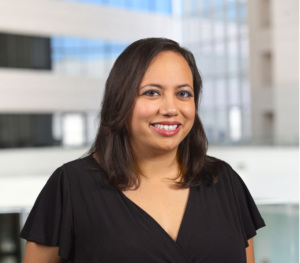 I could give a long list of reasons why the news literacy movement is essential, but for me, it all boils down to people. Everyone I care about is affected by misinformation one way or another, myself included. It’s a huge issue not just for our democracy but also for our collective health, the everyday decisions we make for ourselves and others and our interpersonal relationships.
I could give a long list of reasons why the news literacy movement is essential, but for me, it all boils down to people. Everyone I care about is affected by misinformation one way or another, myself included. It’s a huge issue not just for our democracy but also for our collective health, the everyday decisions we make for ourselves and others and our interpersonal relationships.
Watching the Jan. 6 insurrection at the U.S. Capitol and seeing vaccine misinformation spread during the pandemic were also motivating factors in joining the movement. Misinformation can be distressing, especially when loved ones share it. I like that news literacy is a sensible and practical solution to counter mis- and disinformation.
2. What news literacy tip, tool or guidance do you most often use?
Taking a pause! It sounds simple but it works. Instead of an instant like or share on a social media post, just taking a breather to fact-check or verify claims helps us to avoid contributing to the spread of misinformation.
3. Aside from fighting for facts, what else are you passionate about?
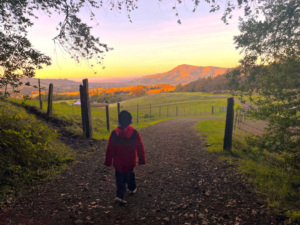
Minichiello’s son hiking a trail near their home in Sonoma County, California.
I’m a notebook addict. Does that count as a passion? I collect notebooks everywhere I go, and anytime I’m in San Francisco one of my first stops is usually the stationery store in Japantown.
I also love being outside as often as I can. Living in Sonoma County, California, we’re fortunate to have access to so many beautiful parks and wineries. It’s a wonderful place to hike and bike. If I need to decompress, working in my garden or taking a walk relaxes me.
4. Are you on team dog, team cat, team wombat?
I’m a former cat person fully converted to team dog! My family and I adopted a 20-pound rat terrier named Loki last year. She is the sweetest little lady! She came with the name Loki, and we didn’t want to change it because she is an adult dog, but we have so many nicknames for her: Loki Dokie, Gnocchi, Mochi, smokey Loki, etc. When I’m working from home, she’s usually curled up right next to me.
And no, I’ve never seen Loki, the Disney+ show, but I heard he’s quite mischievous. My Loki is pretty low key, but every once in a while, she unleashes a little chaos.
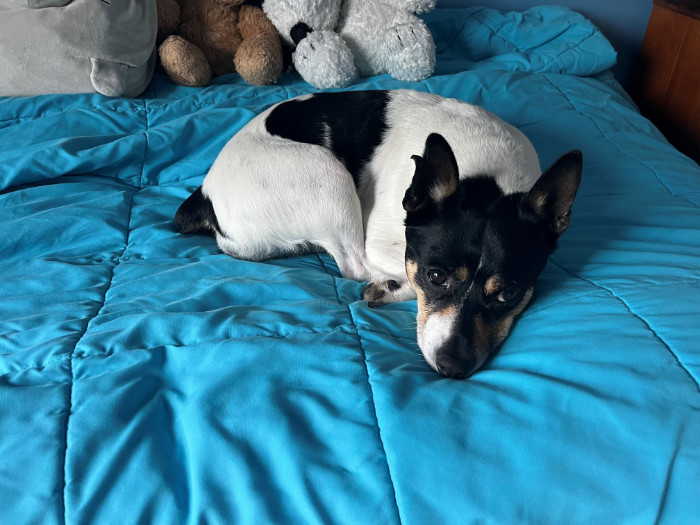
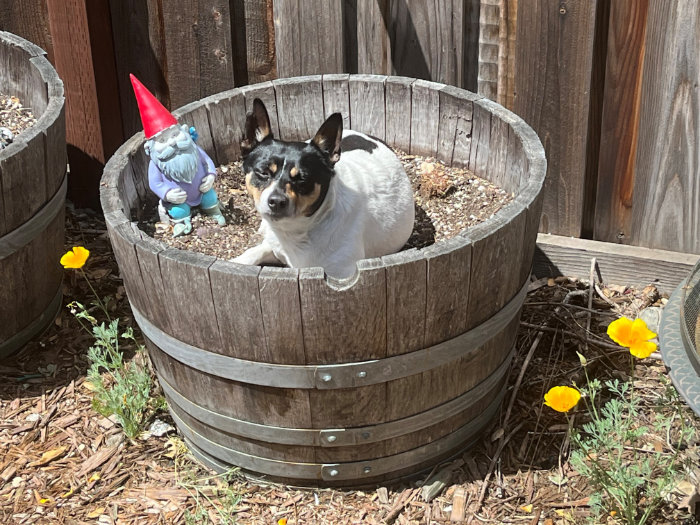
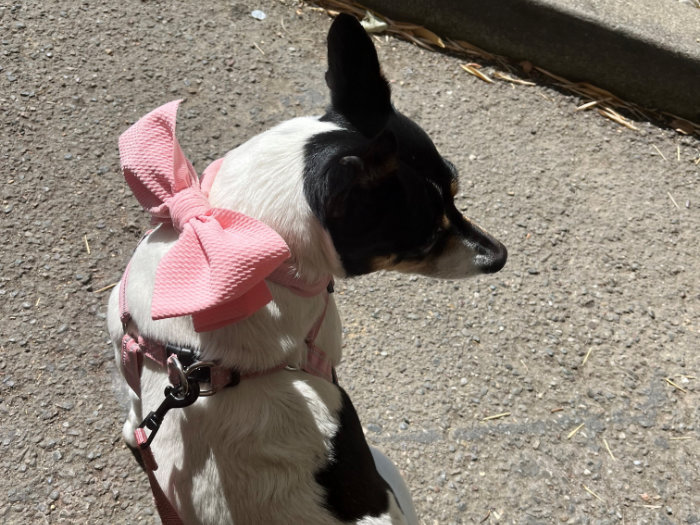
5. And finally, what item do you always have in your fridge?
Eggs from local farms. I love that bright orange yolk you can get only when the eggs are fresh. I cook eggs poached, sunny-side up, in a soft and fluffy French-style omelet with chives, or my favorite Thai omelet over steamed Jasmine rice. (Here’s a good Thai omelet recipe if you’re interested in cooking it, too.)
NLPeople: DeMario Phipps-Smith, senior manager of community learning
DeMario Phipps-Smith
Chicago
 1. What led you to the news literacy movement?
1. What led you to the news literacy movement?
While completing my master’s program, one of my professors tasked me with following newsletters from organizations doing unique things in journalism and news. One of the newsletters I followed was The Sift®. Instantly, I resonated with NLP’s mission and work. I knew it would be a great place to work if I ever got the opportunity.
2. What news literacy tip, tool or guidance do you most often use?
When having productive conversations about misinformation, it’s important to remember P.E.P. You need PATIENCE to understand these conversations take time, EMPATHY to respect other’s knowledge and beliefs and PERSISTENCE to keep up the conversation even when things get tough.
3. Since you joined NLP, what has been your most surprising or satisfying experience?
Having the opportunity to speak at the Obama Foundation Democracy Forum was certainly one of my most cherished experiences at NLP. It was an honor to represent the organization on such a prominent platform, and I got a chance to meet the former president.
4. You said that you’re committed to helping amplify the voices of marginalized communities. Can you talk a little more about that?
I was drawn to journalism because I grew up in a neighborhood in Chicago where Black and Brown people often feel their stories and truths aren’t being depicted accurately in the media. In my current role, I am particularly passionate about helping to bring news literacy training opportunities to marginalized communities to help them combat misinformation — which has disproportionately affected many of these communities.
5. Aside from fighting for facts, what else are you passionate about?
I’m a huge sports fan (Bulls, Bears, White Sox… I know, pray for me). I enjoy live events like catching a Bears game or going to see a band perform at my local bar. I’m also a big foodie, and Chicago has so many great restaurants that I’m excited to try!
6. Are you on team dog, team cat, team wombat?
I’m a fan of most pets, and I side more with team doggo… but currently, I do not have a pet.
7. And finally, what item do you always have in your fridge?
A pack of purified water. I can’t stand tap water, and water is like the most essential part of our diets. Good water is good for your health.
NLPeople: Pam Brunskill, senior manager of education design
This is part of a series that introduces you to the people of NLP.
Pam Brunskill
Buffalo, New York
1. Can you tell us what led you to the news literacy movement?
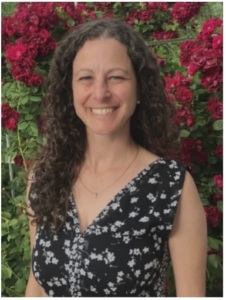 In 2016, I was getting most of my news from Facebook, and I didn’t fully appreciate the impact of that decision until the aftermath of the presidential election. That’s when I realized I was getting different information than some of my friends and family, as well as some untrustworthy information. While I intrinsically realized that social media’s algorithms led to echo chambers and was scattered with misinformation and disinformation, I didn’t yet know how to navigate this digital landscape well. So, I started to actively seek out credible information about social media and news consumption, and through a freelancing job stumbled upon the News Literacy Project. This was the first step in a journey of taking control of my media diet and starting to recognize standards of quality journalism. The more I learned, the more I wanted to be a part of this movement full time.
In 2016, I was getting most of my news from Facebook, and I didn’t fully appreciate the impact of that decision until the aftermath of the presidential election. That’s when I realized I was getting different information than some of my friends and family, as well as some untrustworthy information. While I intrinsically realized that social media’s algorithms led to echo chambers and was scattered with misinformation and disinformation, I didn’t yet know how to navigate this digital landscape well. So, I started to actively seek out credible information about social media and news consumption, and through a freelancing job stumbled upon the News Literacy Project. This was the first step in a journey of taking control of my media diet and starting to recognize standards of quality journalism. The more I learned, the more I wanted to be a part of this movement full time.
2. Since joining NLP, what has been the most satisfying or surprising experience?
My colleagues are some of the most competent, supportive and thoughtful people I’ve ever had the pleasure to work with. While the work we do here is meaningful, the people make the work enjoyable. Being valued and doing something of value is the most satisfying experience.
3. What news literacy tip, tool or guidance do you most often use?
Control-F is probably the tool I use most often, as it helps me find what I’m looking for quickly in web pages (and documents). I lived an embarrassing number of years without knowing hitting Control + F at the same time allows one to search for a specific word or phrase. I used to skim articles and it would take an inordinate amount of time and frustration. Now, if I’m trying to remember where I read about a specific person or idea, or if I’m trying to determine if something is mentioned in a specific page, I can hit Control-F and type in those words to quickly discern whether a text includes what I’m looking for.
4. You have authored several books, including one on information literacy, and you founded a company that created curriculum resources for authors and publishers. Have those experiences informed your work with NLP?
Absolutely. Developing curriculum resources is a mix of science and art. When I wrote my books and developed resources, I had to keep in mind the audience, the purpose and the main objectives. The same holds true with developing resources at NLP, but having the experience of creating these books and other resources first allowed me to better understand the parameters and scope of a project, in addition to little tips like how to format a document. These types of considerations are more methodical, and what I consider the “science” of curriculum development. But then comes the part that’s unique to the project, the “art.” How should we focus the story, lesson, etc.? How will we get the audience engaged? When I worked alone, I usually turned to my family and critique partners to get feedback. Here at NLP, there are numerous people on staff and in the larger education world I turn to for input at various stages of work. This is really a question about craft, a question all creatives — including educators (another part of my background) — can relate to. It’s about how we build something seemingly out of thin air, but in reality, is based on personal background, influences and feedback from respected stakeholders.
5. Aside from fighting for facts, what else are you passionate about?
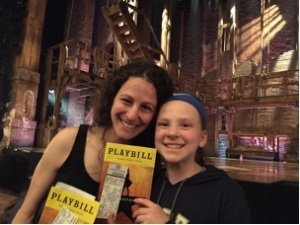 I love books, theater and dance. I just finished Amanda Ripley’s High Conflict, and I think it should be required reading for every adult. It discusses how we get pulled into situations that make us lose our minds, how conflict can take over and how we get out. It is probably the best nonfiction book I’ve read in a decade. When I’m not reading, I’m frequently humming songs in my head. While it’s a constant rotation, showtunes from Hamilton and Wicked often enter that space. I love going to musicals, and my idea of a perfect vacation involves lots of Broadway shows. It would not be out of the ordinary to catch me dancing just about anywhere to these songs or others (even if they’re only playing in my head). Growing up, I took tap, jazz, ballet and lyrical. In college, I started line dancing. Later in life I tested out West Coast Swing, and most recently, Salsa! I’m down with anything that has a good beat.
I love books, theater and dance. I just finished Amanda Ripley’s High Conflict, and I think it should be required reading for every adult. It discusses how we get pulled into situations that make us lose our minds, how conflict can take over and how we get out. It is probably the best nonfiction book I’ve read in a decade. When I’m not reading, I’m frequently humming songs in my head. While it’s a constant rotation, showtunes from Hamilton and Wicked often enter that space. I love going to musicals, and my idea of a perfect vacation involves lots of Broadway shows. It would not be out of the ordinary to catch me dancing just about anywhere to these songs or others (even if they’re only playing in my head). Growing up, I took tap, jazz, ballet and lyrical. In college, I started line dancing. Later in life I tested out West Coast Swing, and most recently, Salsa! I’m down with anything that has a good beat.
6. Are you on team dog, team cat, team wombat?
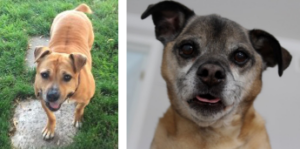 Definitely team dog. Olli has been a steady companion for almost 17 years, going for walks and keeping me company while I work. We rescued Mara, most likely a Staffordshire terrier, in 2020 during the pandemic. Both dogs love to go to the dog park and try to sneak food, and both are very sweet.
Definitely team dog. Olli has been a steady companion for almost 17 years, going for walks and keeping me company while I work. We rescued Mara, most likely a Staffordshire terrier, in 2020 during the pandemic. Both dogs love to go to the dog park and try to sneak food, and both are very sweet.
7. And last, but not least, what item do you always have in your fridge?
Cream cheese because my family eats lots of bagels with cream cheese.
NLPeople: Natalie Quan, senior manager of database operations
Natalie Quan
Calgary, Alberta, Canada
This is part of a series that introduces you to the people behind the scenes at the News Literacy Project.
1. Can you tell us what brought you to NLP?
I came to NLP for a few different reasons, the main one being that I care immensely about facts and truth. If we don’t have those, what do we really have at all? If we can’t agree on reality, how are we supposed to experience or accomplish anything meaningful? Facts are the foundation for a functional society. Truth can be healing and transformative. Further, I think facts and truth are inextricable with justice and equity, and those are very important values to me personally.
2. Since joining NLP, what has been the most satisfying or surprising experience?
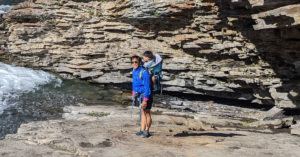 Without question, the best part of working at NLP for me is my team. We operate with so much mutual respect and trust. Even in the face of chaos, we tackle challenges efficiently and effectively to keep driving the mission forward. I’ve never worked with such a competent yet humble group of people who treat one another with so much grace. And while we take our work very seriously and work incredibly hard, we always find a way to have fun doing it.
Without question, the best part of working at NLP for me is my team. We operate with so much mutual respect and trust. Even in the face of chaos, we tackle challenges efficiently and effectively to keep driving the mission forward. I’ve never worked with such a competent yet humble group of people who treat one another with so much grace. And while we take our work very seriously and work incredibly hard, we always find a way to have fun doing it.
In addition, I’m continually pleasantly surprised by how much my work engages me. I’ve been at NLP for almost five years now, longer than any other job I’ve ever had. I tend to hit a wall six to eight months into a new job and feel bored once I understand the scope of my role, but I have yet to experience that here. As the organization grows, my responsibilities are constantly shifting in a way that provides stimulating new ideas, projects and challenges.
3. You practiced law for a time before moving to the world of nonprofits. What made you decide to switch?
Yes, I practiced civil litigation for two years. I did run-of-the-mill plaintiff side work at the state level — contract breaches, malpractice, an actual dog bite case. Then I did defense work on behalf of airlines, airports and aviation insurers at the federal level. I know all the ways one could get injured or worse during flight. It makes for very uplifting dinner table conversation.
I could talk ad nauseam about why I transitioned away from practicing law and the ways I think the patriarchal, Darwinian culture of the legal profession needs to change. But it ultimately came down to two desires: wanting to make a difference on a more macro scale — cliché, I know — and having a nine-to-five job instead of a five-to-nine job. I am enormously privileged to have a partner who supported this career switch, both financially and as an unwavering cheerleader. It was a journey that involved a lot of self-doubt and self-discovery, and though difficult along the way, I have never once regretted leaving the legal profession.
4. You moved to Canada a couple of years ago. Is it true that there are no rude people in Canada?
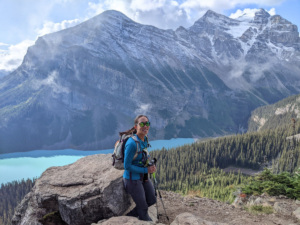 There is not an ounce (or a gram, I should say) of rudeness in Canada. Even the beavers squeak a cheerful “Hello!” and wave when you hike by their lodges.
There is not an ounce (or a gram, I should say) of rudeness in Canada. Even the beavers squeak a cheerful “Hello!” and wave when you hike by their lodges.
In all seriousness, rudeness exists anywhere people exist. But Canadian politeness is real. And it’s not just politeness. My experience has been that it’s genuine empathy, a deep sense of social responsibility, and an organic sense of community. In general, it has been very interesting to observe the cultural similarities and differences between California — specifically, Los Angeles and the San Francisco Bay Area — where I spent the first 33 years of my life, and Calgary. Overall, though winters were an adjustment, the avid hiker and backpacker in me absolutely loves living here, a short drive away from the Canadian Rockies.
5. Are you on team dog, team cat, team wombat?
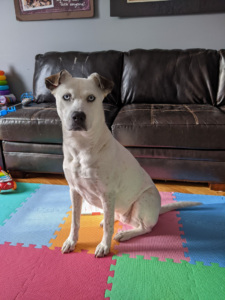 I consider myself to be on team nature and therefore love all animals… except spiders. Sorry, I just can’t do spiders. I would rather lie in a bath of roaches, snakes or pretty much anything else that creeps or crawls.
I consider myself to be on team nature and therefore love all animals… except spiders. Sorry, I just can’t do spiders. I would rather lie in a bath of roaches, snakes or pretty much anything else that creeps or crawls.
I am especially on team dog. We have a 10-year-old Siberian husky and boxer mix named Zephyr. In her younger years, she was the best running and hiking partner I could’ve asked for. These days, she spends most of her time sleeping and eating the abundance of food that our two-year-old tosses on the floor — a pretty good retirement.
6. What one item do you always have in your fridge?
At the risk of sounding boring and basic, apples. Apples are great for any meal of the day, as a snack or even for dessert. They’re inexpensive and easy to find during all seasons of the year. You can eat them with cinnamon, nut butters, granola and so many other foods for quick, simple nutrition. Whenever my friends and I go backpacking, everyone else is eager to eat foods such as pizza or burgers when we return to civilization, and all I can think about is the satisfying crunch of a good apple.
NLPeople: Christina Veiga, senior director of media relations
This is part of a series that introduces you to the people of NLP.
Christina Veiga, senior director of media relations
New Jersey
 1. Can you tell us a little about your background and what brought you to NLP?
1. Can you tell us a little about your background and what brought you to NLP?
I grew up in the suburbs of South Florida and spent most of my time as a kid barefoot in our backyard catching lizards or swimming in the pool.
I fell in love with journalism in high school. I needed to fill up some elective credits, and my mom suggested signing up for a journalism class because my teachers had always told me I was good at writing. I am naturally introverted but also always curious. In that class, I found that having a notebook and a story assignment were great excuses to talk to people and ask all the questions I always wondered about.
I studied journalism at Florida International University and was a reporter for more than a decade. At the Miami Herald, I covered cities large and small across South Florida and the Miami-Dade County school system. Then I joined the nonprofit newsroom Chalkbeat, where I covered education in New York City. Writing about the nation’s largest school system during the pandemic was one of the hardest things I’ve ever done.
The Jan. 6th insurrection left me deeply unsettled and led me to NLP. Watching the Capitol get ransacked showed the stark consequences to our democracy when society does not operate from a shared set of facts. It made me want to start an organization that would help people find credible information and avoid being misled. Instead, after a few quick Google searches, I stumbled on NLP. It was a relief to know lots of smart people were already tackling this problem, and it made me want to help spread the word so that everyone knows about and can benefit from the important work NLP does.
2. How have your experiences covering the Miami-Dade schools for the Miami Herald and reporting for Chalkbeat informed your work at NLP?
To have a healthy, functioning democracy, I believe that it’s vital to have a vibrant press and an education system that serves all children well. Working for NLP is a perfect blend of my career-long desire to change education and journalism for the better.
My favorite thing about being a journalist was discovering and elevating important stories. Now I get to do that for NLP. I love finding all the different stories we can tell about our work, and the inspiring things our educators are doing in classrooms across the country. I am constantly thinking about whose voices need to be heard.
3. What news literacy tip, tool or guidance do you most often use?
My favorite news literacy tip is: Always consider multiple sources. This tip covers so many news literacy skills in one.
By pausing to consider multiple sources, we’re less likely to spread information that’s false. It also helps people break out of filter bubbles that just reinforce existing beliefs. You’ll be less likely to get duped by a source that’s not credible if you seek information from more than one place.
Checking multiple sources is a multi-tasking news literacy tip. It’s easy for anyone to start doing it right away.
 4. Aside from fighting for facts, what else are you passionate about?
4. Aside from fighting for facts, what else are you passionate about?
I go to the beach every opportunity I have. I love swimming in the ocean, though it has been hard to get used to the cold water in the Northeast compared to South Florida. Yoga helps me feel strong and relaxed. I try to read a printed newspaper every day.
During the pandemic, my partner and I have become avid Scrabble players. We have sucked in lots of formerly reluctant family members and friends who are also now hooked.
5. Are you on team dog, team cat, team wombat? Or are you pet-free?
I’ve never had a dog or cat although I consider myself an animal lover. I have some potted begonias — they’re pretty plants with spotted, multi-color leaves and hot pink flowers — but I am far from a green thumb.
When I’m ready for a pet, I’d probably adopt a dog — a big, shaggy dog that likes catching frisbees on the beach.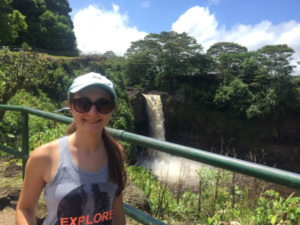
6. What item do you always have in your fridge?
Berries! I eat them every day. Strawberries. Blueberries. Blackberries. Raspberries. They’re my favorite food, the perfect snack, and you don’t feel guilty eating them by the fistful.
That doesn’t mean I always eat healthy foods, though. If you had asked what I always have in the pantry, I’d say chocolate chip cookies. The crunchy kind.
7. What’s in your backpack, laptop case or pocket right now?
Everything! My purse is usually bursting. I like to go on epic walks to explore new neighborhoods, so I pack a bag with all the stuff I could need while out and about. I always have band aids, sunglasses, a big water bottle, an external phone charger, some kind of snack… I could go on and on.
NLPeople: Dan Evon, senior manager of education design
Dan Evon, Chicago
This is part of a series that introduces you to the people behind the scenes at the News Literacy Project.
1. Can you tell us a little about your background and how your experience as a fact-checker at Snopes led you to NLP?
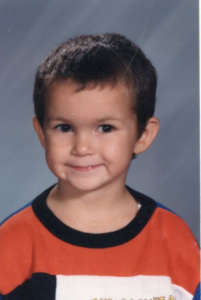 I grew up in the suburbs of Chicago and now live on the city’s southside. I worked a variety of writing gigs after graduating from the University of New Orleans, (I covered everything from motorcycle racing to breaking news stories), but my main focus has been in the field of fact-checking.
I grew up in the suburbs of Chicago and now live on the city’s southside. I worked a variety of writing gigs after graduating from the University of New Orleans, (I covered everything from motorcycle racing to breaking news stories), but my main focus has been in the field of fact-checking.
Fact-checking work can be very rewarding, but it can also feel a bit like Sisyphus pushing a boulder up a never-ending mountain. Every time a rumor is debunked, another pops up to take its place. And worse, these rumors can rack up millions of views while the subsequent fact checks reach a substantially smaller audience. The work of fact-checkers is vitally important, but it’s also not enough. I joined the News Literacy Project because the only way we’re going to turn the tide against the endless stream of baseless claims, fake photos, and political propaganda, is by teaching people how to do some of this fact-checking work themselves.
2. What news literacy tip, tool or guidance do you most often use?
The tool I use the most is a chrome web extension called the “Fake news debunker” by InVID and WeVerify that allows me to perform a reverse image search on a variety of sites (TinEye, Google Images, Yandex, etc…) in just a few clicks. I use it for work to debunk misinformation, but it is also a great tool to learn more about viral content. Lots of photos and videos circulate online attached to just a few words. With a few clicks, I can dig a little deeper and learn some cool new facts.
I think the biggest advice or guidance I try to follow in my daily life is to recognize when my thought process is being clouded (or blocked) by emotions. When something makes us laugh or cry or become angry, it’s easy to let our guard down and believe something just because we want it to be true. When we learn to recognize those moments, telling fact from fiction gets a lot easier.
3. In college, one of your majors was film history. Can you name your favorite film or films of all time?
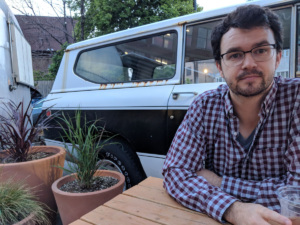 That’s a tough one. My favorite film of the last year is probably Everything, Everywhere, All At Once because it really is something that is unlike anything else I’ve ever seen. But of all time? Spotlight and Shattered Glass are two great movies about journalism, I love big action movies like Jurassic Park, have a bit of a soft spot for rom-coms (I am keenly aware of when a cheesy movie is trying to manipulate my emotions, yet also helpless to stop it), and really enjoy silly comedies like Billy Madison. I’m going to say my all-time favorite movie is The Devil Wears Prada.
That’s a tough one. My favorite film of the last year is probably Everything, Everywhere, All At Once because it really is something that is unlike anything else I’ve ever seen. But of all time? Spotlight and Shattered Glass are two great movies about journalism, I love big action movies like Jurassic Park, have a bit of a soft spot for rom-coms (I am keenly aware of when a cheesy movie is trying to manipulate my emotions, yet also helpless to stop it), and really enjoy silly comedies like Billy Madison. I’m going to say my all-time favorite movie is The Devil Wears Prada.
4. Aside from fighting for facts, what else are you passionate about?
The COVID-19 pandemic really had an impact on my hobbies. I started birding, playing disc golf and video games. Three activities that weren’t really in my life prior to 2020, and three activities that I now can’t do without.
5. Are you on team dog, team cat, team wombat? Or are you pet-free?
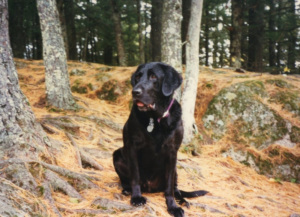 I have been on team bunny, team ferret, team cat, and team turtle, but I have traditionally played for team dog. Unfortunately, I am team no pet at the moment but here’s a photo of my late dog Tucker.
I have been on team bunny, team ferret, team cat, and team turtle, but I have traditionally played for team dog. Unfortunately, I am team no pet at the moment but here’s a photo of my late dog Tucker.
6. What item do you always have in your fridge?
I’m going to give two answers here. The first is cheese. All sorts of cheese. I’d estimate that I now have at least seven varieties of cheese in my fridge. And second, some sort of flavored coffee creamer, because life is too short for bitter coffee.
7. What’s in your backpack, laptop case or pocket right now?
I carry a sling bag just about everywhere I go. It has a battery charger, water bottle, hand sanitizer, notebook, pens and a New Literacy Project-branded tote bag in it all times, with some extra space for whatever I’m reading, which right now is a book called Tomorrow and Tomorrow and Tomorrow.
NLPeople: Ebonee Otoo, senior vice president of educator engagement
Ebonee Otoo, Dallas, Texas
This is part of a series that introduces you to the people behind the scenes at the News Literacy Project.
1. Can you tell us what brought you to NLP?
NLP was the perfect marriage between my background in journalism and love for education. I was working for the Office of the State Superintendent of Education in D.C. when a former colleague told me she saw a role I’d be perfect for. I applied the same day. Between my applying and getting the job, the pandemic began. I thought it was surreal to work for this cause in 2020 during the middle of the perfect storm of misinformation: the COVID-19 pandemic, a contentious election and a racial uprising following the death of George Floyd. I knew immediately I’d made the right, and most necessary, choice for such an unprecedented time.
2. How has your background as a coalition builder and community engagement expert influenced your work at NLP?
I’m proud to have spent my career working for causes I’m passionate about. I have worked with some of the best coalition builders in the country. Throughout my career, building and working directly with the community, I’ve learned that it’s important to listen to what the people want. If you pay attention, communities know what they need. My background has given me the courage to believe in the power of communities. I see value in every educator we encounter, and I am eager to co-create a future with them that we can both be happy to live in.
I’ve learned that people don’t need to be empowered. They have power. They often don’t have the resources to harness that power. That is where NLP comes in. We offer support, training, resources and a community platform that enables educators to teach the skills learners need to know. Now that is a lot of power!
What I love about my work at NLP is that I get to listen to educators and help meet their needs. We are a solution to a problem they’re facing every day. I can’t think of a better way to spend my life than building a movement of educators passionate about creating a more news-literate nation.
 3. Aside from fighting for facts, what else are you passionate about?
3. Aside from fighting for facts, what else are you passionate about?
I’m passionate about mentorship. I have been mentoring since 2013. Being a mentor is an important part of my personal ideology for a life of service. There is a lot of evidence that correlates mentoring with positive outcomes for young people. And since I’ve benefited so greatly from mentors, it’s only fitting that I extend that same opportunity to someone else. I recently traveled with a mentee to Ghana in June 2022. It was her first time in Africa. We visited several parts of the country, including the slave castles on the coast. It was one of the most memorable trips of my life, and I think the same is true for her.
 4. Are you on team dog, team cat, team wombat? Or do you prefer stuffed animals to pets?
4. Are you on team dog, team cat, team wombat? Or do you prefer stuffed animals to pets?
While I love cats, I’m team dog. I have a pandemic puppy named Psalm. She’s a small land shark, but we’ve braved the last year and a half together.
5. What item do you always have in your fridge?
BBQ sauce. I put it on everything.
NLPeople: Mary Lynn Hickey, senior vice president of administration
Mary Lynn Hickey
Berkeley Springs, West Virginia
This is part of a series that introduces you to the people of NLP.
1. Can you tell us a little about your background and what brought you to NLP?
As a nonprofit administrator for over 20 years, I have always gravitated toward career opportunities with mission-driven organizations. When I saw the job posting for a program administrator at NLP back in the fall of 2011, I knew this would be a truly unique opportunity to be part of what was then a very small nonprofit but one with such an impressively ambitious mission.
2. You were one of NLP founder Alan Miller’s first hires. What has it been like to be with NLP through its rapid growth and evolution?
Bearing witness to the stunning trajectory of Alan’s bold vision, which has evolved perhaps beyond our imagination way back when, has me feeling more than a little bit awestruck. When I started working at NLP, Checkology®, the virtual platform that allowed NLP to grow to scale was still in the planning stage, and we had classroom programs in Chicago, New York City and DC. Eleven years later, NLP is now reaching an audience across all 50 states and over 100 countries!
3. Since joining NLP, what has been your most satisfying or surprising experience?
It’s hard to pick a single moment because there have been so many celebratory milestones over the years that we can all be very proud of. Looking back though, I would say that being able to contribute so substantially in earlier years when there were so few of us, and we were all working so hard in service to a such a timely and critical mission was an experience that I was so honored to have been a part of. It is enormously satisfying to look back and appreciate NLP’s larger and ever-growing audience who value our mission and work as much as we always did. I well know what a rare and treasured opportunity I’ve had to work here.
4. What news literacy tip, tool or guidance do you most often use?
I value and use them all! I do love and most often the geolocation tool. Reverse image search is a good one too.
5. Aside from fighting for facts, what else are you passionate about?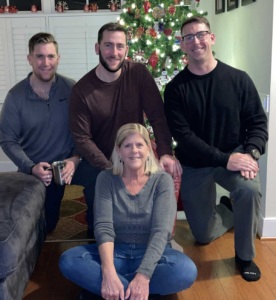
I have three sons who are my heart and of whom I am enormously proud. Their more conventionally defined successes aside, they have grown up to be thoughtful and kind young men whose company I enjoy beyond measure. I’m also passionate about the healing arts and am dedicated to making more space these days for my Reiki practice.
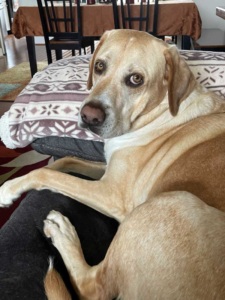 6. Are you on team dog, team cat, team wombat?
6. Are you on team dog, team cat, team wombat?
Hard stop for team dog! Ahh, my fourth “son” is Luke! He almost got washed away in the hurricanes in Puerto Rico back in 2017 but due to his amazing chi, he was instead rescued and sent up north where he eventually ended up at the local shelter in Loudoun County, Virginia. I met him the very morning he had been released from his medical hold and committed on the spot to take him home with me. He was my first, my last and likely my only pet ever because, well, he is irreplaceable!
7. What one item do you always have in your fridge?
Organic creamer for my morning tea. At the start every day, I enjoy a large mug of tea in the early morning stillness before all the noise and busyness of my day.
NLPeople: Sara Lewis, operations manager
NLPeople Sara Lewis
Takoma Park, Maryland
This is part of a series that introduces you to the people behind the scenes at the News Literacy Project.
 1.) Can you tell us a little about your background and what brought you to NLP?
1.) Can you tell us a little about your background and what brought you to NLP?
I was born and raised in Grand Rapids, Michigan, and am a proud Michigander. At the University of Michigan, service was a big part of my college experience, and it was through volunteering with children that I decided I wanted to be a teacher. I joined Teach for America right out of college and began my professional journey in education. I taught high school and middle school social studies for seven years, most of them in Washington, D.C., and then I then transitioned to supporting teachers through working in operations at education nonprofits in New Haven and Boston. After being a full-time mom for five years, I then found my way to NLP, which felt like a perfect fit for me as a former social studies teacher and nonprofit operations manager.
 2.) How has your Teach for America experience working with students in underserved areas informed your work at NLP?
2.) How has your Teach for America experience working with students in underserved areas informed your work at NLP?
Well to start, I so wish that NLP had been in existence when I was teaching social studies. As a former teacher, not only can I appreciate the incredible resources NLP provides for educators, but I also understand the need for strong systems to make an organization run smoothly. When I was teaching in urban public schools several years ago, there were broken systems at every turn and that kept all stakeholders from having the experience that they deserved. Thus, when I started working in nonprofit operations, I made it a priority to create and implement organized systems that make life easier for all staff and the educators we serve.
3.) Since joining NLP, what has been your most satisfying or surprising experience?
During my first year of teaching, I spent each evening reviewing and sometimes learning the content that I was about to teach the next day. And while staying just a day ahead of my students certainly wasn’t ideal, I did truly enjoy learning new material that I hadn’t been taught in my history classes. Lacking a background in journalism, I was surprised to discover when I first started working for NLP just how much I didn’t know about what goes into creating quality news. I soon realized that one of the biggest perks of this job would be getting to again learn something new every day. At NLP, I am constantly learning new things about news literacy and that’s been probably the most satisfying and surprising part of being a part of this organization.
 4.) You have young kids; do they understand NLP’s work and your role?
4.) You have young kids; do they understand NLP’s work and your role?
The other day I overheard a conversation between my 7-year-old daughter and a friend in which they were discussing what their parents did at work. My daughter explained to her friend that her mom “helps people understand what to believe on the internet,” so she has a general understanding of the work that NLP does. My 10-year-old son certainly has a higher level of understanding of NLP’s work than his sister. He has always been quite precocious, and like his mom, is a history buff and a news junkie. One of my favorite things to do with him while we’re in the car on the way to soccer practice is to listen to news podcasts and then talk about the content. I look forward to introducing him to Checkology in the near future!
5.) What news literacy tip, tool or guidance do you most often use?
I’m not sure that this is the tool I use most often, but my favorite new literacy tool is probably geolocation. While my family is quite settled in our current house and we have no plans to move anytime soon, I am a real estate junkie and I love checking out the online listings of nearby homes for sale and using Google Street View to explore new neighborhoods.
6.) Aside from fighting for facts, what else are you passionate about?
The outdoors! I love being outside in all sorts of weather, particularly in the snow. Unfortunately for me, D.C. gets only one or two good snowfalls a year (if that). I grew up skiing, ice skating on the lake, playing ice hockey, and building snow forts, and I love to find ways to get outside with my family. One of the best parts of the pandemic has been all the hiking that I’ve been able to convince my husband and kids to do with me. In addition to playing outside, I also love traveling and exploring new places.
7.) Are you on team dog, team cat, team wombat? Or do you prefer stuffed animals to pets?
My mother is quite the animal lover, and I grew up with dogs, cats, guinea pigs, cockatiels, finches, fish, frogs and bunnies. Somehow, I managed to marry a man who is not even an animal liker, thus our house is devoid of pets. But I’m definitely on team dog. Someday I plan to come home with a dog and hopefully my husband will come around to the new member of our family.
8.) What item do you always have in your fridge?
A lemon. I use lemons all the time. In my tea, squeezed over roasted veggies, to make marinades and dressings, etc.
9.) What’s in your backpack, laptop case or pocket right now?
I’m a mom so I of course have a giant purse that contains all the usual items (keys, wallet, mask, reusable grocery bags), but then I also have lots of snacks, band-aids and Kleenex. Oh, and my planner, which is made of paper! I get teased for having a paper planner, but I much prefer this old school method of organizing my life.
NLPeople: Jake Lloyd, social media manager
This is part of a series that introduces you to the people of NLP.
Jake Lloyd, social media manager, Seattle, Washington
1. Can you tell us a little about your background and what brought you to NLP?
I have a journalism background, having grown up in Michigan reading the sports page of the Ann Arbor News (RIP) every afternoon and then writing for a local paper and the school weekly while in college. Post-graduation, I moved south and cobbled together freelance sports writing gigs in Durham, North Carolina, for a couple years during the middle of the recession. As fun as it was covering college basketball games in an incredibly competitive market, I decided to try something new through AmeriCorps. That’s what landed me in D.C. doing communications for a local nonprofit, DC SCORES, which I fell in love with. The focus soon became social media (learning Twitter in 2009 was fun!), and nine years later, a friend sent me a tweet — of course — about the opening at NLP and I jumped at the opportunity. While in D.C., I also did some freelance writing for the AP (Associated Press) and started a niche podcast on the American University men’s basketball team with two friends – we were the only media outlet that consistently covered the team!
2. How has working for NLP impacted your life or changed your world perspective?
Where do I start? When I joined NLP in 2018, I knew that the work was important and I had heard people bandy about the (now-meaningless) term “fake news,” but I really had no idea how pervasive the threat of misinformation and disinformation was to all aspects of society. It’s obviously only gotten worse since I came on board. Personally, I’ve learned to look at every story (and tweet) with nuance and a critical eye; to check my emotions at the door of every conversation about every topic; to triple-check who’s actually saying what; and to understand that multiple things can be true. Professionally, I feel privileged to work for an organization that’s tackling the biggest, most overarching problem worldwide. Name me a crisis today that couldn’t be helped by news literacy.
3. Since joining NLP, what has been the most satisfying or surprising experience?
This is weird since I haven’t met half of them in-person, but you just know when you’re working with really good people who are all dedicated to a cause — and that’s 100% the case with NLP’s staff. From our few in-person interactions (remember 2019?) to the day-to-day virtual world we now inhabit, the work wouldn’t feel so meaningful if not for the people doing it. Our community is strong despite the physical miles between us.
4. What news literacy tip, tool or resource do you most often use?
This seems simple, but just to pause, to slow down. We often say “sanitize before you share” — a term we’ve used a lot during COVID-19 — and it rings so true to me. With any piece of information, if you just take a beat and truly assess it, you’re much less likely to share a falsehood or be tricked by a bad actor.
5. You recently moved cross country. What prompted you to make such a big move?
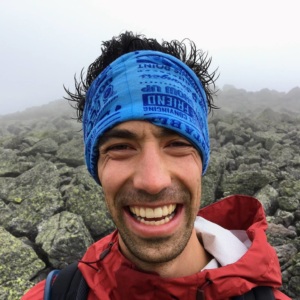 The outdoors! The PNW’s been on my radar for quite some time and after 12 years in D.C., it was time to head to the mountains and the wealth of big-nature opportunities that this area of the country has at its doorstep. Plus, it’s pretty cool to watch basketball games here that don’t end at 1 a.m.!
The outdoors! The PNW’s been on my radar for quite some time and after 12 years in D.C., it was time to head to the mountains and the wealth of big-nature opportunities that this area of the country has at its doorstep. Plus, it’s pretty cool to watch basketball games here that don’t end at 1 a.m.!
6. What is the first thing you will do once we fully emerge from the seemingly unceasing COVID-19 pandemic?
Oof! Probably go to as many big indoor events — hoops games, maybe a few concerts, etc. — as I can handle in a very short period of time. Also, I’ll visit some friends I haven’t seen in a few years.
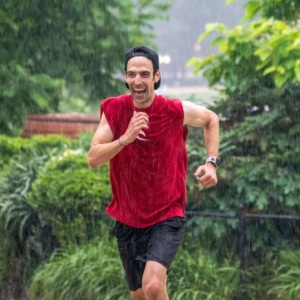 7. Aside from fighting for facts, what else are you passionate about?
7. Aside from fighting for facts, what else are you passionate about?
As mentioned above, I love the outdoors. I just feel more alive when I’m outside — whether I’m running, hiking, biking or skiing (that’s a new, PNW-induced hobby; I’m very much an amateur). From biking down the west coast to running five 50K ultramarathons with number six coming up in June, to leading a morning free fitness-based community called November Project while in D.C. and taking in the most beautiful sunrises, I dig physical challenges in beautiful places and I also love all weather, especially rain (thus the move to Seattle). And I shouldn’t neglect basketball on this — I’m a bit of a nerd. Have you tried the NBA version of Wordle called Poeltl? It’s a daily fix for me.
8. Are you on team dog, team cat, team wombat? Or do you prefer stuffed animals to pets?
Dog/cat for sure, although I’m also a squirrel guy — they get a bad rap. I don’t own pets, but we have six chickens coming in a couple months, so that should be interesting.
9. What’s one item you always have in your refrigerator?
Siracha and salsa.
10. What’s in your pocket/backpack/laptop case right now?
Just checked — nothing! Working from home has its perks 😊.
NLPeople: Chuck Salter, president and CEO
This is part of a series that introduces you to the people behind the scenes at the News Literacy Project.
Chuck Salter
Washington, D.C.
- Can you tell us a little about your background and what brought you to NLP?
My father was an Army officer drafted during Vietnam, and both my parents were in the medical field. I’m the youngest of three sons. Both the small size of our family and the experience of moving so often when I was younger helped us become incredibly close as a family. My parents instilled in me a sense of service that has defined my professional life. I discovered in college as a tutor, TA and music instructor that I really enjoyed teaching. I was accepted into Teach For America in 1997, and my career path was forever altered. And 20 years later, I found myself moving back to the D.C. area to work with NLP. - Since joining NLP, what has been the most satisfying or surprising experience?
I’ve really enjoyed learning about a whole new field: journalism. As a news junkie, I was surprised to learn how ignorant I was about the profession, how news is made and the challenges the field faces every day in living up to its highest standards. I keep this in mind to give me perspective and empathy for those we serve — remembering that even the most “informed” among us may not understand what it truly takes to be a free and responsible press. - You’ve had different jobs throughout the education sector. What makes NLP different from the others?
I’ve been a teacher, principal, superintendent and teachers union president. And I’ve worked as a regional manager and national leader for several educational nonprofits. I’m not sure I could imagine doing anything else. But in my 20 years of work before coming to NLP, my efforts were focused largely on serving marginalized communities, working for that still-elusive goal of educational equity for all. At NLP, our focus is on a singular issue that affects all students, regardless of demographics, geography or social status. So while the focus of the work is much narrower, the scope of its impact is far, far broader than anything I’ve done before. - Aside from fighting for facts, what else are you passionate about?

My work at NLP is a perfect combination of the issues I’m most passionate about: education, democratic participation and even civil rights. I do believe education is the foundation to all other agency and opportunities someone can have to reach their best selves. And a strong, representative democratic system is the best way for fully realized people to control their destiny. With regards to civil rights, as a member of the LGBT+ community, I’d say this is my most personal passion. Beyond simply allowing people to live their lives on equal terms with others, I don’t understand the hatred some people hold for others based on personal characteristics. On one level, I know it’s rooted in fear and misunderstanding, but the origin of such passionate hate some people exhibit toward others not like them — and all the other bad behavior that then excuses — will always be a mystery to me. And a source of personal sadness. But on a less serious note, I’m also pretty crazy about cooking, traveling, photography and, most recently, gardening. - You’ve lived many places and done a great deal of traveling. Any favorite places or highlights?
Without getting too sentimental, I consider it a great privilege to have lived all over this country. It’s given me an appreciation for and a heightened sense of patriotism toward the United States, even without really having a place to call my “hometown.” I would not dare compare regions or cities here — they all offer something unique and wonderful. Outside of the country, my favorite city, hands down, is London. I got married in May, and the first part of our honeymoon was a return trip to London. I’ve even considered living there a couple of times. But probably the two most wondrous places I’ve traveled to are Italy and South Africa, though I admit I’ve still got a few more continents to visit before I can declare my definitive favorite. - Are you on team dog, team cat, team wombat?

As a member of ASPCA for many years now, I think animals in general are great and deserving of much more respect than a lot of people give them. And I certainly understand the deep joy a pet can bring to someone. But since you asked me to vote, while I do love so many kinds of dogs, I really have to say I’m a cat person through and through. Our cat, Erasmus, is 19 years old (I got him in law school!) and truly part of the family.
NLPeople: Eryn Busch, executive and board liaison
Eryn Busch
Washington, D.C.
This is part of a series that introduces you to the people behind the scenes at the News Literacy Project.
1. Can you tell us a little about your background and what brought you to NLP?
In sixth grade, my principal brought various speakers in to inspire us to think about our future careers, what we wanted to contribute to society and why we should already be worried about the value of compound interest. The most compelling of the speakers was a man named Faustin Uzabakiliho, who spoke to us about his escape from the Rwandan genocide and his subsequent work as an evangelist. I’ll never forget him telling us that, most likely, the job we were going to have someday had not even been invented yet, and neither had the company we’d be working for. He encouraged us to dream big, generalize and never pass up an opportunity to serve. So, I took his advice. I joined the Army after high school and took a circuitous route through all manner of adventures and failures to what has been a very fulfilling four years at NLP. I’ve also dabbled in phlebotomy, private security for a royal family, gun sales and voice acting.
2. How (if so) has working for NLP impacted your life or changed your world perspective?
 My pre-internet upbringing in the foothills of Los Angeles was far removed from a lot of the painful realities of how the American experience has not offered equal opportunity for everyone. But in 2019, we as a staff had the opportunity to travel to Montgomery, Alabama, to tour the Legacy Museum and The National Memorial for Peace and Justice (projects of the Equal Justice Initiative). My words can’t do the experience justice, but I think of that trip as the beginning of my reeducation. Every single day I think about that trip and what I learned. I now quietly seek out literature, creators and nonprofits that build on that experience, and I plan to take my daughter when she’s old enough to see it for her own eyes.
My pre-internet upbringing in the foothills of Los Angeles was far removed from a lot of the painful realities of how the American experience has not offered equal opportunity for everyone. But in 2019, we as a staff had the opportunity to travel to Montgomery, Alabama, to tour the Legacy Museum and The National Memorial for Peace and Justice (projects of the Equal Justice Initiative). My words can’t do the experience justice, but I think of that trip as the beginning of my reeducation. Every single day I think about that trip and what I learned. I now quietly seek out literature, creators and nonprofits that build on that experience, and I plan to take my daughter when she’s old enough to see it for her own eyes.
3. You served in Iraq as a Civil Affairs Sergeant with the U.S. Army during a surge in operations, and back home, as an assistant to senior White House officials. Have those experiences impacted how you approach your work at NLP and your life?
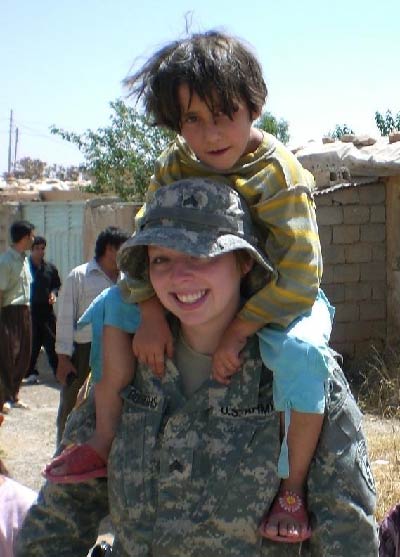 Well, I’m still very tired from those adventures, I’ll say that. But I’m also very fulfilled because working at NLP is a natural extension of working in public service. A couple years before joining NLP, my life was turned upside down overnight by a conspiracy theory. People online picked apart as much of my life as they could, including my military service and my time at the White House, concocting stories about me from the wildly fantastical to the truly dark and traitorous. They almost made me feel that my service was forfeited. I had to change my phone number and then my name, and there were regular attempts to steal my old identity. My family and I seriously considered moving, and my heartbeat would quicken when I would see an unexpected package on my stoop (and admittedly, this still happens). So, when I saw that NLP was hiring for my exact skill set, I jumped at the chance to join the fight for facts because I have been on the other side of misinformation, and I’ve seen how it can do permanent damage. Working at NLP gives me a sense that I’m helping prevent this from happening to others. As with my work in the Army and at the White House, doing the right thing or preventing the wrong thing from happening doesn’t usually make the headlines. That’s hard to remember every time we see a headline about the damage misinformation does, but there won’t be a headline for the chaos our work is preventing, nor for the lives I truly believe we are saving.
Well, I’m still very tired from those adventures, I’ll say that. But I’m also very fulfilled because working at NLP is a natural extension of working in public service. A couple years before joining NLP, my life was turned upside down overnight by a conspiracy theory. People online picked apart as much of my life as they could, including my military service and my time at the White House, concocting stories about me from the wildly fantastical to the truly dark and traitorous. They almost made me feel that my service was forfeited. I had to change my phone number and then my name, and there were regular attempts to steal my old identity. My family and I seriously considered moving, and my heartbeat would quicken when I would see an unexpected package on my stoop (and admittedly, this still happens). So, when I saw that NLP was hiring for my exact skill set, I jumped at the chance to join the fight for facts because I have been on the other side of misinformation, and I’ve seen how it can do permanent damage. Working at NLP gives me a sense that I’m helping prevent this from happening to others. As with my work in the Army and at the White House, doing the right thing or preventing the wrong thing from happening doesn’t usually make the headlines. That’s hard to remember every time we see a headline about the damage misinformation does, but there won’t be a headline for the chaos our work is preventing, nor for the lives I truly believe we are saving.
4. What is the most surprising thing you have learned or experienced since joining NLP?
My colleagues’ epic karaoke choices aside, I’d say it has been fascinating to watch NLP grow and walk the fine line between nonprofit and ed tech startup. I remember being very intrigued by that during the interview process. When I explain to friends and family what we do and what we offer, I love watching their faces light up. I think a lot of people still feel powerless in the face of misinformation and our work gives them real hope —even better than hope. It gives them a way they can act.
5. What news literacy tip, tool or guidance do you most often use?
I am admittedly a compulsive reverse image searcher! I didn’t even know all the ways to do it quickly and easily until I saw our tutorial on it this past summer.
6. What did you miss most during the COVID-19 shutdowns?
At one point I would have said concerts and live music, but what I truly miss most is seeing my astoundingly brilliant colleagues in action and supporting their professional development presentations and NewsLitCamps when they come to D.C. I miss watching educators’ faces light up and hearing their audible gasps when they are taught a concept or tool to help them help their students navigate what many thought was a hopeless information wasteland. They leave our events empowered. I know they still do, but I miss seeing that and celebrating it together.
7. Aside from fighting for facts, what else are you passionate about?
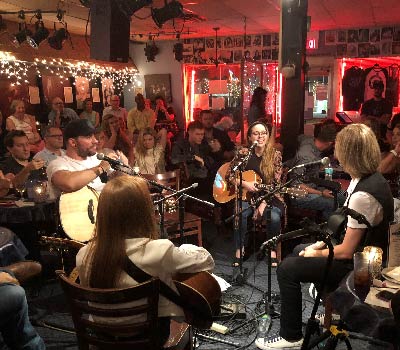 I’ve been a songwriter for 21 years, and joining NLP gave me more work/life balance to focus on my craft every day, which in turn gave me the confidence to start performing. So many supportive colleagues came to my shows around the D.C. area. A highlight of my life was getting invited to perform in the round at The Bluebird Café in Nashville (the songwriters all sit in a circle facing each other with the audience around them). I retired from performing in January 2020, and since then I’ve contented myself with making music in my basement studio and taking on voiceover work occasionally. Most recently, I voiced the text and arranged the music for an audiobook of poetry coming out on Audible this December.
I’ve been a songwriter for 21 years, and joining NLP gave me more work/life balance to focus on my craft every day, which in turn gave me the confidence to start performing. So many supportive colleagues came to my shows around the D.C. area. A highlight of my life was getting invited to perform in the round at The Bluebird Café in Nashville (the songwriters all sit in a circle facing each other with the audience around them). I retired from performing in January 2020, and since then I’ve contented myself with making music in my basement studio and taking on voiceover work occasionally. Most recently, I voiced the text and arranged the music for an audiobook of poetry coming out on Audible this December.
8. Are you on team dog, team cat, team wombat? Or do you prefer stuffed animals to pets? (If you have a pet, please consider sharing a photo.)
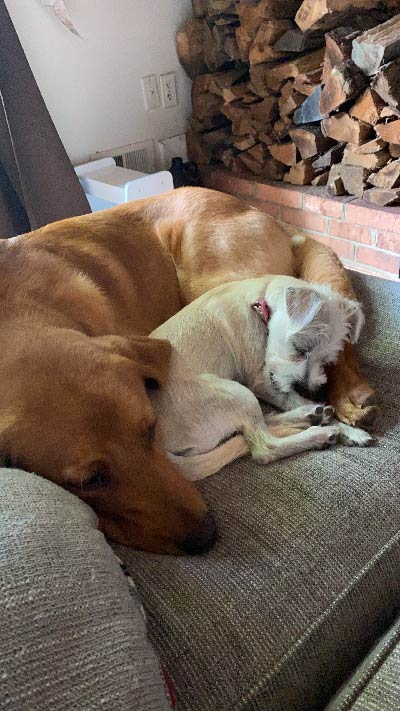 Can I be team everything? I’m team everything (except spiders). My daughter and I adore snakes and would love to get a ball python to join our cat and dog, but so far, we’ve been outvoted by my husband and mother. I grew up in apartments, which forced me to be a cat person, but now I finally have a friendly dog who loves to hang out with other NLP dogs (see picture). One of my favorite moments at NLP was when my colleague Miriam adopted our foster dog, Reign, a mere week before we shut down for the pandemic.
Can I be team everything? I’m team everything (except spiders). My daughter and I adore snakes and would love to get a ball python to join our cat and dog, but so far, we’ve been outvoted by my husband and mother. I grew up in apartments, which forced me to be a cat person, but now I finally have a friendly dog who loves to hang out with other NLP dogs (see picture). One of my favorite moments at NLP was when my colleague Miriam adopted our foster dog, Reign, a mere week before we shut down for the pandemic.
(Picture: Gus and Ebonee’s dog Psalm, 2021)
9. What one item do you always have in your refrigerator?
Peanut butter.
10. What’s in your pocket/backpack/laptop case right now?
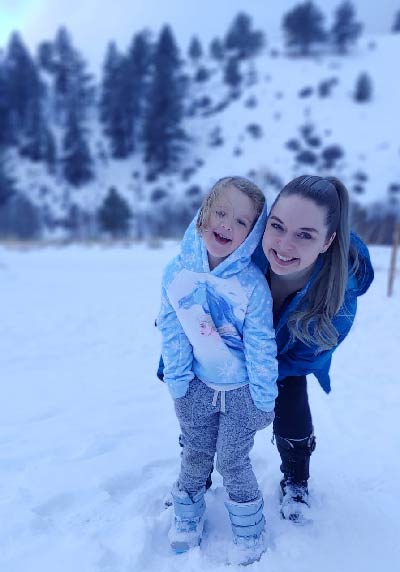 I don’t go anywhere without my daily planner/journal that I custom-made over the course of the pandemic. I got tired of hunting for the perfect planner and just created it in Microsoft Word. It took three months to finish, but it was worth it to have something that helps me keep my own life together. My daughter and I were recently both diagnosed with ADHD and anxiety within a few months of each other, so we’ve been learning together about the tools and tricks available to help people like us function in the world.
I don’t go anywhere without my daily planner/journal that I custom-made over the course of the pandemic. I got tired of hunting for the perfect planner and just created it in Microsoft Word. It took three months to finish, but it was worth it to have something that helps me keep my own life together. My daughter and I were recently both diagnosed with ADHD and anxiety within a few months of each other, so we’ve been learning together about the tools and tricks available to help people like us function in the world.
NLPeople: Andrea Lin, design manager
Andrea Lin
Washington, D.C.
This is part of a series that introduces you to the people behind the scenes at the News Literacy Project.
1. Can you tell us a little about your background and what brought you to NLP?
How I joined NLP has often felt like a stroke of luck! I studied public relations and graphic design in college, and after graduating, I knew I wanted to explore opportunities that would allow me to contribute to my passions in design, journalism, and youth development. For a bit, I felt torn on what direction to follow, like I had to make a choice on one or the other. When my previous managing editor forwarded me the visual designer opening at NLP, I couldn’t believe how perfectly this position matched the intersections of the ways in which I wanted to make a difference in the world.
2. While studying at American University, you were editor-in-chief of a student magazine and co-chair of the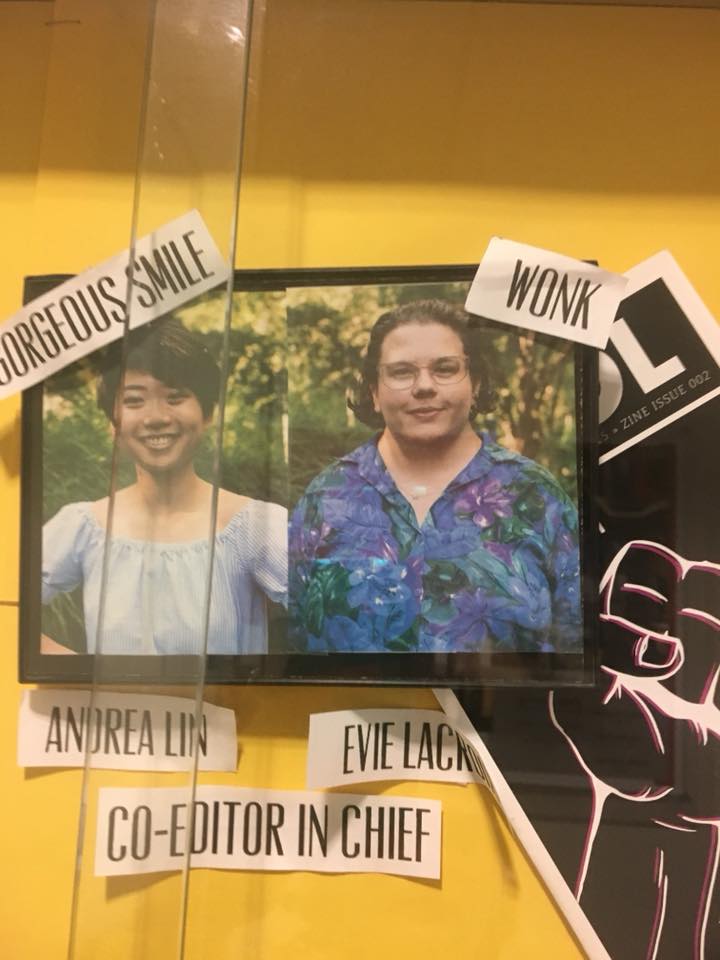 university’s Student Media Board, which comprised 10 publications. Did you confront issues related to news literacy in that work, or have you been able to look back on those positions through a news literacy lens?
university’s Student Media Board, which comprised 10 publications. Did you confront issues related to news literacy in that work, or have you been able to look back on those positions through a news literacy lens?
I think American University is a very well-read bubble, evident in the number of students active in media organizations and the multitude of professional opportunities given for networking and internships. It was exciting to be able to learn and collaborate with classmates and professors who were all very invested in the mission of quality journalism and meaningful storytelling. I was an undergrad between 2014 and 2017, and I think one of the more prevalent conversations was one that was also happening across other college campuses at the time: the role of a journalist and the standards of objectivity when they come up against current social movements. We had ongoing conversations about distinguishing the ethics and role of op-eds, freedom of speech and what it means to represent critical perspectives.
Looking back now, learning to navigate these issues as they played out across the country was an invaluable way for us to really see the immediate and pressing consequences of news literacy on civic engagement. I think that same ethos is also how Checkology® and NLP have found such a winning formula in how they approach news literacy education, tying these concepts to real-world current issues with real impacts on our everyday lives.
3. What is the most surprising thing you have learned or experienced since joining NLP?
I used to believe plainly that having more information and more access to news sources was always a “good” thing and meant it was easier for more people to stay informed. Early on when I joined NLP, I was surprised to have this belief challenged, although it feels very obvious now. More access and more information alone does not lead to more informed decisions — they have to be accompanied by critical thinking skills and the ability to sift and evaluate what is worth consuming. I think about this NLP tip about an abundance of information and how true it has been with the spread of COVID-19 misinformation.
4. What news literacy tip, tool or guidance do you most often use?
I love digital verification tools that help me fact-check shared images or videos on social media. As easy as it is these days to manipulate images, there are also so many neat resources online that are free and accessible that we can use to investigate digital media ourselves. Both in my work and in my personal life, it’s been super useful to know what kind of visual clues to look for in a photo and how to do a reverse image-search or using Google Maps.
5. Aside from fighting for facts, what else are you passionate about?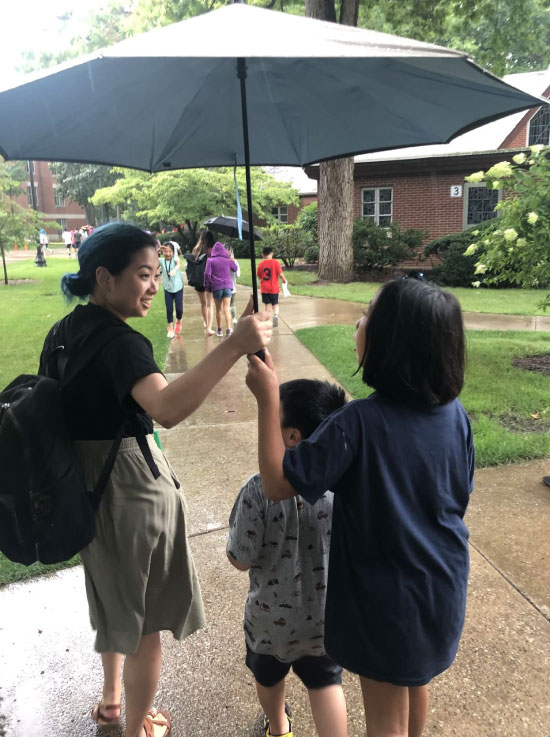
In my spare time, I volunteer annually for a weeklong Taiwanese American youth summer conference in the Midwest. We foster personal growth and leadership skills with our campers from grades one through 12. I love getting to see our young campers challenge themselves and grow so much in just one week. Being with my community is very grounding, and it fills my heart every year to see how much these children care about the world around them. They are constantly impressing me and surprising me with what they accomplish. Folks love to underestimate children all the time, but I see for myself how individuals can thrive when you show them that you believe in them.
6. Are you on team dog, team cat, team wombat? Or do you prefer stuffed animals to pets? (If you have a pet, please consider sharing a photo.)
I am a big fan of all furry pets, and I will always stop to admire a cutie when they pass on the street, but I am unquestionably Team Cat.
7. What one item do you always have in your refrigerator?
I get made fun of for this all the time, but I genuinely just enjoy the taste of V8 and tomato juice. When I’m feeling particularly wild, I’ll indulge with the spicy hot version of V8.
NLPeople: Miriam Romais, senior manager, educator engagement
This is part of a series that introduces you to the people of NLP.
Miriam Romais
Saratoga Springs, New York
This is part of a series that introduces you to the people behind the scenes at the News Literacy Project.
1. Can you tell us a little about your background and what brought you to NLP?
My background is in documentary photography. I was given a camera in high school, and visual storytelling has been my focus ever since. After college, I freelanced as a photojournalist for local papers in New Jersey but soon realized it didn’t completely match my interests. I wanted to spend more time with the people I was photographing and dive into stories that went far beyond the assignment. I wanted to see and learn more than just that single narrative, as we are all multi-layered, complex beings. Although I am first-generation estadosunidense, I credit that curiosity to growing up in Brazil (where my family is from), as it deeply influenced how I see and experience life — how we position ourselves and navigate the world among classes, races, cultures and experiences. Seeing a lack of representation in images we consume is also what led me to become a photo editor/publisher, director and a curator at En Foco, a nonprofit that supports photographers of African, Asian, Latino, Native American and Pacific Islander heritage. My own photographic work focuses on creating images that convey the dignity of the person on the other side of the camera, and I see that as a collaborative partnership. I had recently finished my MBA with a concentration in global brand marketing and was exploring ways to bring this knowledge into the nonprofit world when I saw a listing posted by a photojournalist I knew who was then working at NLP. The more I learned about the organization, the more interested I became. And with the encouragement of friend and journalist David Gonzalez of the New York Times, who was a volunteer in NLP’s Newsroom to Classroom program in its early days, I took the plunge.
2. How has working for NLP impacted your life or changed your world perspective?
Reading and interpreting images has allowed me to apply a photo-focus to how I look at various other media. I’ve always been an obsessive note taker, making sure I have the info I need for photo captions. When I heard Nicole Frugé of the San Francisco Chronicle say in a NewsLitCamp a few years ago that “photojournalism IS journalism” — and discuss the importance of captions — I felt seen and validated. Photojournalists are more than picture-makers; they are an integral part in the story being conveyed. My pet peeve is hearing someone say “a photo is worth a thousand words” because it’s really a thousand different and sometimes conflicting words as we all see the world via our own lens and experience. And working at NLP has also made me acutely aware of the depth and reach of misinformation affecting so many more people I am close to than I ever thought.
3. How has your work as a photographer and your efforts supporting photographers of color influenced your work at NLP?
En Foco, where I worked for over 20 years, was a space for photographers of color to thrive. It was led by photographers of color, nurturing and providing opportunities that are challenging to find in the mainstream media or art world. Journalism is rife with stories “about” people of color, but often not told by them. We advocated for voices that ensured a pluralism in the field of photography. To me, the carryover to NLP is similar yet just as urgent. We have seen the consequences of inaccurately portraying or stating something or not standing up to wrongdoings, so helping others explore the information they consume — whether written or visual — is incredibly satisfying. I recall explaining what NLP does to a close friend when I first joined, and she exclaimed, “It’s like you joined the X-men in the fight against misinformation!” I still love that.
4. What is the most surprising thing you have learned or experienced since joining NLP?
The most surprising thing to me, is the prevalence of well-meaning people accidentally amplifying misinformation, or choosing to do nothing when they see it online or hear others echoing information without thinking about it first. Wasn’t that called gossip in the before-times? Most people don’t take the time to question information or consider its origin, which heightens this malaise of misinformation. I remember seeing an article saying that falsehoods are 70% more likely to be retweeted than the truth and reach their first 1,500 people six times faster because we are distracted or feeling lazy. Those are eye-opening numbers, so I’ve been learning how to thoughtfully engage in such conversations.
5. What news literacy tip, tool or guidance do you most often use?
Lateral reading. You might think it should be reverse image search, but as a photographer, I find it way easier to spot manipulated images than to know all the details surrounding a particular context or story. I love learning new things, and drilling down to find varied and reliable sources has been an essential part of that.
6. What is the first thing you will do as we fully emerge from the COVID-19 pandemic?
Have multiple parties with those I most cherish and hug them every two minutes, maybe more. It would be outdoors with solar lights and papel picado strung throughout the trees, candles and firepit blazing, songs and laughter (and tears for those we’ve lost), and loads of yummy Brazilian food.
7. Aside from fighting for facts, what else are you passionate about?
In no particular order: good photography, martial arts (I am a black belt in Taekwondo), scuba diving, motorcycle safety (I am a former national trainer and current RiderCoach for MSF-usa.org.), travel, the environment, especially reducing my plastic consumption, and people in all their complicated splendor.
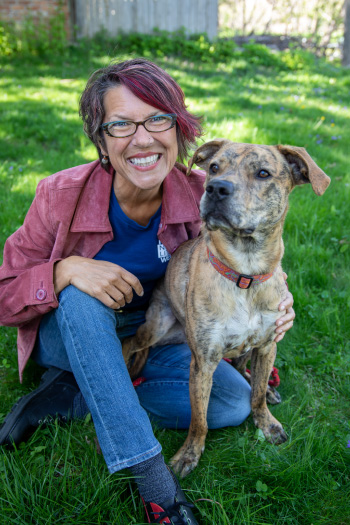
8. Are you on team dog, team cat, team wombat? Or do you prefer stuffed animals to pets?
Team dog! We fell in love with Reign since the first photo our NLP colleague Eryn posted on Slack. She was fostering the pup, who was found as a stray in West Virginia. We drove down to D.C. to meet her and drove home together that same weekend. She has kept us on our toes ever since and spends most of her time flopping on the floor asking for belly rubs in between trying to tree squirrels.
9. What one item do you always have in your refrigerator?
Bacon and farm fresh eggs at the ready, although we don’t keep those in the fridge.
10. What’s in your pocket/backpack/laptop case right now?
I haven’t had to carry it around for so long, I had to go look! Magenta stickie note pad, my favorite mechanical pencil, extra battery pack (for when my camera with the ring-tone runs low on power), and dark chocolate (OK, that might be a bit stale by now…)
NLPeople: John Silva, senior director of education and training
John Silva
Chicago
is is the first in an occasional series that introduces you to the people behind the scenes at the News Literacy Project.
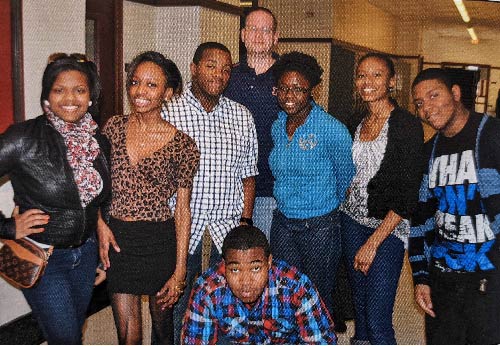
Silva and his debate team at Lindblom Math & Science Academy in Chicago
1. Can you tell us about your background and what brought you to NLP?
Prior to joining NLP four years ago, I was a classroom teacher for 13 years. I taught middle and high school social studies in Chicago Public Schools. I was actually introduced to NLP’s early programs while teaching middle school. I taught a variety of subjects, but my favorites were “History of Chicago” and “Argument and Debate.” Before becoming a teacher, I worked in a variety of positions in corporate telecommunications (which I hated) mostly focused on cellular and wireless networking. I’ve lived in Chicago for almost 25 years but I grew up mostly in California (Navy brat).
2. You are a veteran of the U.S. Marines. Could you share a little bit of your experience serving your country?
Having grown up in a military family, I enlisted and served in the end years of the Cold War. Enlisting was almost expected (though my old man hated that I joined the Marines). My dad spent 27 years in the Navy; my sister retired from the Navy after 25 years, and our Mom was a Marine in the late ‘60s. It was at times exceptionally challenging and other times very boring. I was selected for the Marine Presidential Guard program and served with the Guard Company at the Marine Barracks in Washington, D.C. Later I transferred to the Fleet Marine Force as an infantryman assigned to the 1st Battalion, 4th Marine Regiment at Camp Pendleton, California. I did get to visit some amazing places while deployed with the 11th Marine Expeditionary Unit (Special Operations Capable) including parts of Asia, the Middle East, the Horn of Africa and Australia.
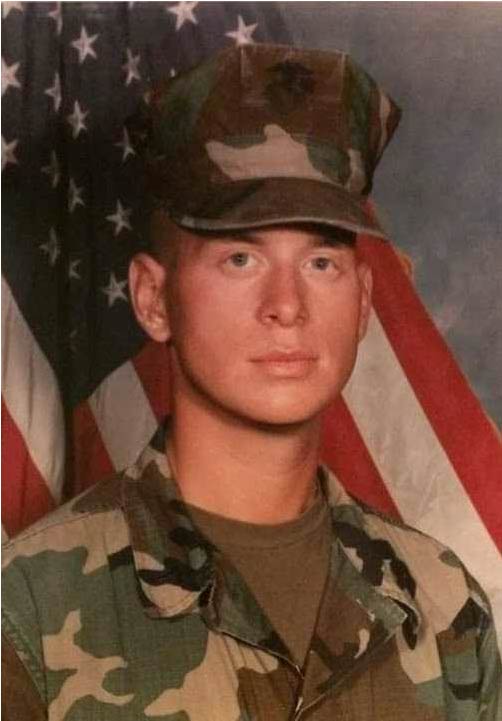
PFC John Silva, USMC, School of Infantry, Camp Pendleton, California, 1990.
3. How has being a Marine influenced your work or your approach to life?
Part of why I hated corporate America was that it didn’t feel like there was a real purpose. I was just another worker in a sea of cubicles, and none of us really cared about why we were doing our jobs. It was because of that experience that I quit my job and enrolled in school to earn my teaching degree at the University of Illinois at Chicago. Becoming a teacher was in many ways similar to serving in the military. I was part of a team of professionals working towards a larger, important goal. Each of us had to contribute to the success of our mission. I have that same sense of purpose with our work at NLP.
4. What is the most surprising thing you have learned or experienced since joining NLP?
I think watching the explosive growth of conspiracy theories like QAnon has been fascinating and disconcerting to watch. The pandemic in particular created a perfect storm for those beliefs to flourish (much like a virus). I’ve also been surprised by how much my son Alex, 11, has learned from being around my work and how much misinformation he’s already being exposed to. He’s really interested in conspiracy theories and knows way more about them than any 11-year-old should. I guess that would be the most surprising – my son and I have bonded over conspiracy theories.
5. What news literacy tip, tool or guidance do you most often use or recommend?
When in doubt, Google it. So much false information can be easily debunked in less than 20 seconds.
6. What is the first thing you will do once we fully emerge from the COVID-19 pandemic?
I am really looking forward to traveling again. I travel a lot for work, which is fun, but I also try to travel a few times a year for pleasure. My girlfriend and I already have several ideas in mind for trips, and I have promised my son a trip to see the Grand Canyon.
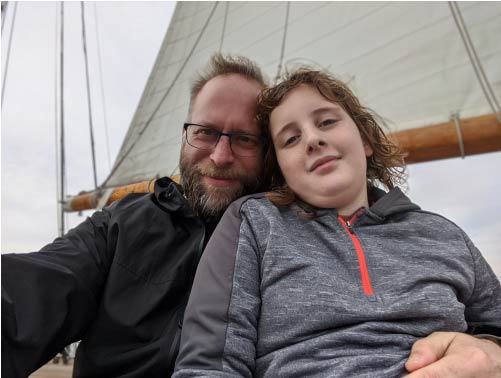
John and his son, Alex.
7. Aside from fighting for facts, what else are you passionate about?
I love to cook. A couple of years ago I took a week off from work to go to a five-day culinary “boot camp” at The Chopping Block here in Chicago. I learned so much, and it’s a joy to prepare good food for people. I plan to enroll in the follow-up course at some point to learn some advanced skills. I’m also hoping to start teaching my son soon. He’s becoming a real foodie and loves trying new foods. Also, I bought a house about six months ago and I have been enjoying decorating and updating it. I recently started working to create space for a small garden.
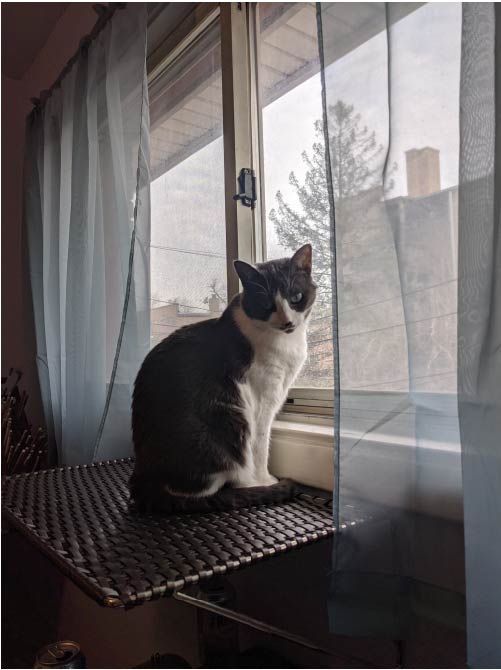
John’s cat, Minuette, on the shelf John built for her to look out the window.
8. Are you on team dog, team cat, team wombat?
I am team cat. I adopted Minuette two years ago. She has a special perch for the window in my office and makes frequent appearances in my video calls and webinars. I’ve also become good friends with Hazel and Petunia, my girlfriend’s basset hounds.
9. What one item do you always have in your refrigerator?
I always have frozen minced garlic for cooking and real maple syrup for making an Old Fashioned.
10. What’s in your messenger bag right now?
I have a small leather notebook holder (I’m old school and prefer to write things down), a big water bottle and my Kindle. Those three things are always in my bag.
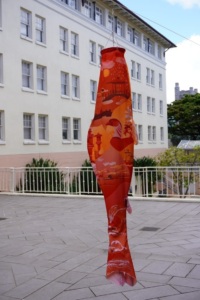 3. You worked on high-profile design projects while still an undergrad, such as a piece that was exhibited in Tokyo Midtown’s “Open the Park” event, an international exhibition, which must have been exciting. What type of design work would you love to do in the future?
3. You worked on high-profile design projects while still an undergrad, such as a piece that was exhibited in Tokyo Midtown’s “Open the Park” event, an international exhibition, which must have been exciting. What type of design work would you love to do in the future?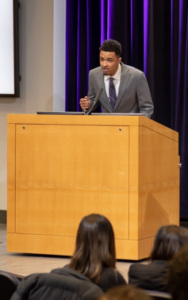 1. What led you to the news literacy movement?
1. What led you to the news literacy movement? 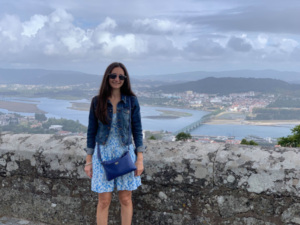 1. Can you tell us a little about your background and what brought you to NLP?
1. Can you tell us a little about your background and what brought you to NLP?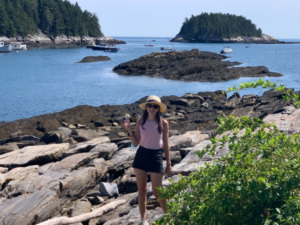 4. Aside from fighting for facts, what else are you passionate about?
4. Aside from fighting for facts, what else are you passionate about?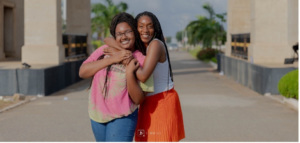 3. Aside from fighting for facts, what else are you passionate about?
3. Aside from fighting for facts, what else are you passionate about?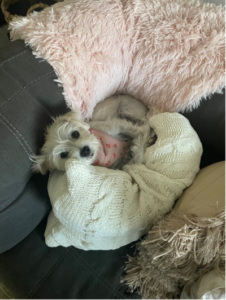 4. Are you on team dog, team cat, team wombat? Or do you prefer stuffed animals to pets?
4. Are you on team dog, team cat, team wombat? Or do you prefer stuffed animals to pets?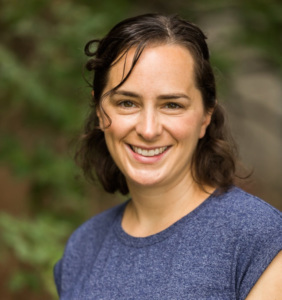 1.) Can you tell us a little about your background and what brought you to NLP?
1.) Can you tell us a little about your background and what brought you to NLP?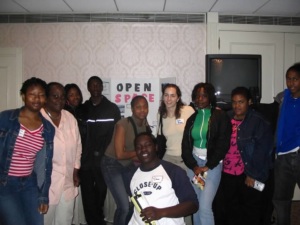 2.) How has your Teach for America experience working with students in underserved areas informed your work at NLP?
2.) How has your Teach for America experience working with students in underserved areas informed your work at NLP?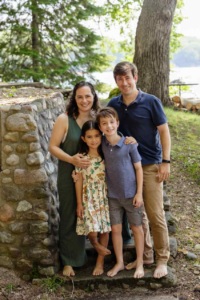 4.) You have young kids; do they understand NLP’s work and your role?
4.) You have young kids; do they understand NLP’s work and your role?